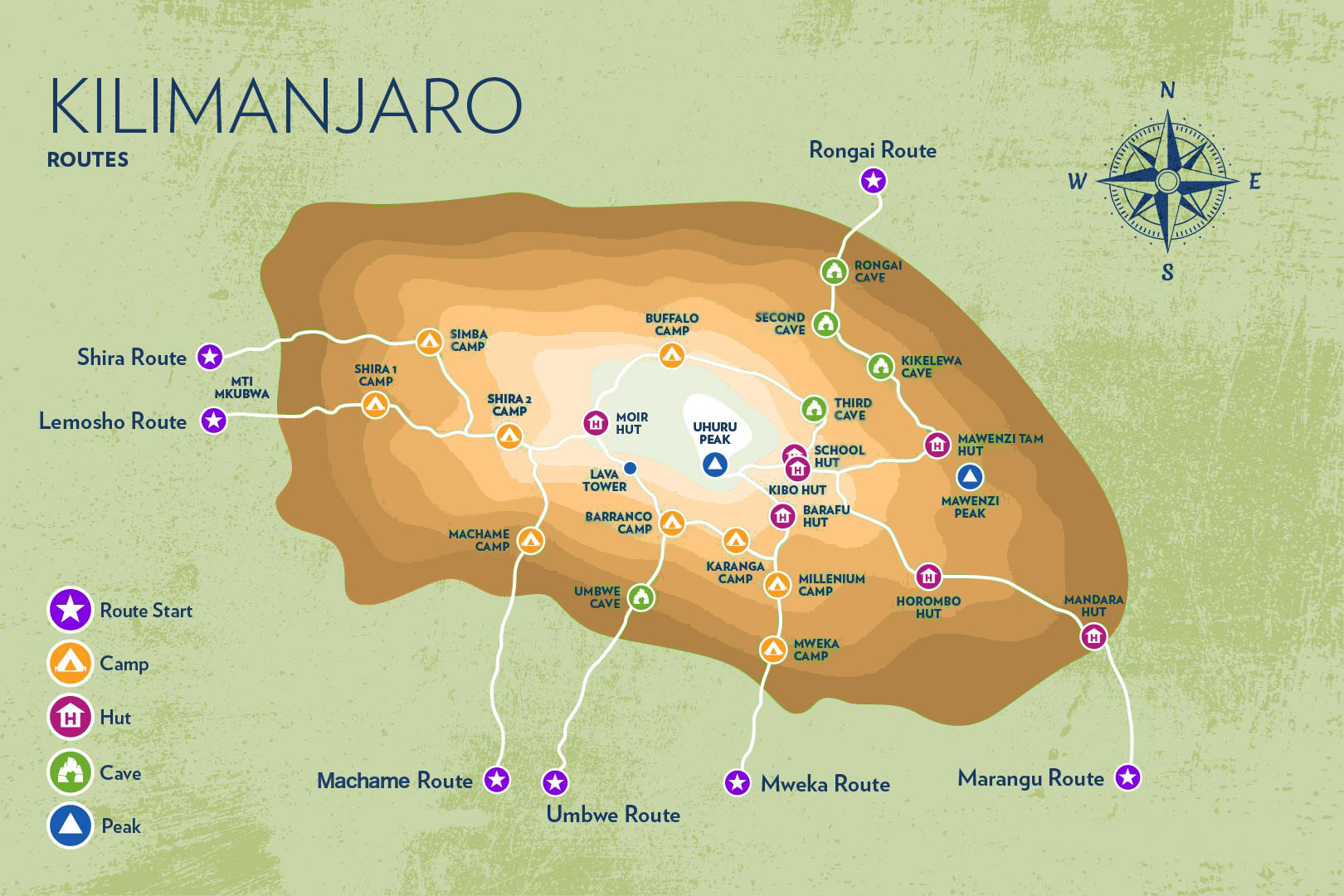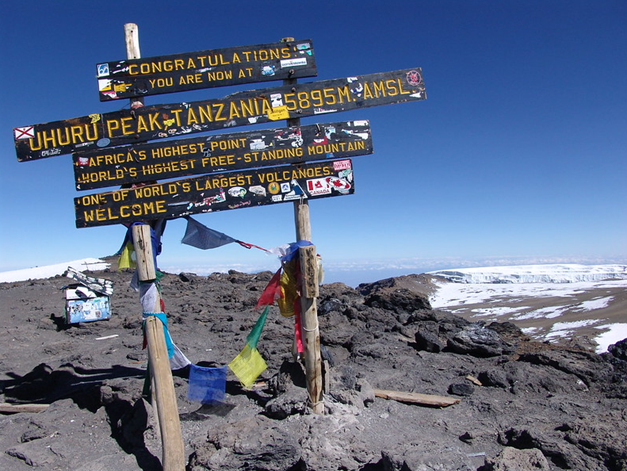7-day Rongai Route
The Rongai route is the only route approaching Kilimanjaro from the north, close to the Kenyan border. Though gaining popularity amongst climbers, Rongai has low traffic. It is the preferred route for those looking for an alternative to the crowded Marangu route, those who would like a more remote hike, and those who are climbing during the rainy season (the north side receives less precipitation). The minimum number of days required for this route is six, and seven days are recommended. Although the scenery is not as varied as the western routes, Rongai makes up for this by passing through true wilderness areas for days before joining the Marangu route at Kibo camp. This route descends the Marangu route. Rongai is a moderately difficult route and is highly recommended, especially for those with less backpacking experience.

DAY 1 – Nalemoru Gate to First Cave (Simba) Camp
Elevation: 6,234 to 8,612ft (1900 to 2625m)
Distance: 5 mi (8 km)
Hiking Time: 4-5 hours
This morning we will drive to the village of Nale Moru for the starting point of the Rongai route. The first stage of the trek is through farmland and pine forests. You may have a chance to see the beautiful Colobus monkeys, or if you’re lucky enough, elephants or buffalos en route. Our first camp will be the Simba Camp located at the edge of the moorland zone.

DAY 2 – First Cave (Simba) Camp to Second Cave Camp
Elevation: 8,612 to 11,417ft (2625 to 3480m)
Distance: 3.1 mi (5 km)
Hiking Time: 3-4 hours
The morning hike is a steady ascent up to the Second Cave Camp located in the moorland zone with superb views of Kibo and the Eastern ice fields on the crater rim.
DAY 3 – Second Cave Camp to Kikelewa Camp
Elevation: 11,417 to 12,070ft (3480 to 3679m)
Distance: 3.1 mi (5 km)
Hiking Time: 3-4 hours
Leaving the pine forest behind us, we carry on with a steady ascent walking through the moorland. There are superb views of the Eastern ice fields on the crater rim of Kibo, the highest of the three volcanoes that form the mountain. We will leave the main trail and strike out across moorland on a smaller path towards the jagged peaks of Mawenzi, the second of Kilimanjaro’s volcanoes. We will set up camp today in the sheltered valley near Kikelewa caves.

DAY 4 – Kikelewa Camp to Mawenzi Tarn Camp
Elevation: 12,070 to 14,118ft (3679 to 4303m)
Distance: 5 mi (8 km)
Hiking Time: 4-5 hours
A short but steep climb up grassy slopes offers superb views of this wilderness area. The vegetation zone ends shortly before you reach your next camp at Mawenzi Tarn, spectacularly situated beneath the towering spires of Mawenzi. Spend the afternoon acclimatizing and exploring the area.

DAY 5 – Mawenzi Tarn Camp to Kibo Hut
Elevation: 14,118 to 15,518ft (4303 to 4730m)
Distance: 5 mi (8 km)
Hiking Time: 5-6 hours
After breakfast, we head west and continue ascending on the east side of Kibo crossing the saddle between Mawenzi and Kibo taking 4 to 5 hours to reach Kibo Hut. The remainder of the day is spent resting in preparation for the final ascent, which begins around midnight. Overnight at Kibo hut.

DAY 6 – Kibo Hut to Summit to Horombo Hut
Elevation: 15,518 to 19,345ft; down to 12,156ft (4730 to 5896m; down to 3705m)
Distance: 4 mi ascent / 10 mi descent (6.4 km ascent / 16.1 km descent)
Distance: 4 mi ascent / 10 mi descent (6.4 km ascent / 16.1 km descent)
You will rise around 11 pm, and after some tea and biscuits you shuffle off into the night – this is where the going gets tough. The first section of the trail consists of a rocky path to the Hans Meyer Cave (16,896ft / 5150m), also a good resting spot. The path then zigzags up to Gillman’s point (18,638ft / 5681m), which is located on the crater rim. This section is very steep with a lot of stone scree, requiring a great physical and mental effort. This is probably the most demanding section of the entire route. Do the Kili shuffle and move slowly.
From Gilman’s Point, you will likely encounter snow up to Uhuru Peak (19,345ft / 5896m), the highest point in Africa. Total exhilaration and satisfaction – you made it! Weather conditions on the summit will determine how long you will be able to spend taking photographs, before the 3-hour descent back to Kibo hut. After a short rest at Kibo hut, you gather all the gear you left behind for the ascent and head down to Horombo hut (3 hours) for your overnight.
The return to Horombo hut will seem surprisingly fast compared to the ascent. The total time spent walking on this day is around 14 hours, so be prepared for a very tough day. Later in the evening, you enjoy your last dinner on the mountain and a well-earned sleep, filled with memories and stirring emotions.

DAY 7 – Horombo Hut to Marangu Gate
Elevation: 12,156 to 6,102ft (3705 to 1860m)
Distance: 18 mi (29 km)
Hiking Time: 6-8 hours
After breakfast you continue your descent, passing the Mandara hut, down to the Marangu gate. At Marangu gate, you sign your name and details in a register. This is also where successful climbers receive their summit certificates. Those climbers who reached Gillman’s Point are issued with green certificates and those who reached Uhuru Peak receive gold certificates. You now drive back to Moshi for a long overdue hot shower, dinner descent bed, and celebrations!!
DAY 8 – Departure
If your time in Africa ends today, our transfer team will drive you back to Kilimanjaro International Airport (JRO) for your departure. If you have booked a safari with us, or a few days to dissolve into the pristine sandy beaches and tropical waters of Zanzibar, we will be there to help you comfortably transition from your climb into your next Tanzanian adventure.
- Pre & Post Trek accommodation
- Professional mountain guides, cooks, and porters
- Transportation to & from the mountain gate
- Park fees, camping fees & rescue fees
- 18% VAT on tour fees & services
- Double layered Sleeping Mats
- 3 meals daily while on the mountain
- Filtered water throughout the trek
- Portable toilets and toilets tents
- Hot water for washing purposes
- Pick up and drop off at Kilimanjaro international airport (JRO)
- Fair wages for the mountain crew as approved by the Kilimanjaro National Park Authority (KINAPA), Kilimanjaro Association of Tour Operators (KIATO)
- International flights
- Tip to the driver, guide, and hoteliers
- Insurance fees
- Guiding fees
- Cost of Visas
- Bank transfer charges & card payments processing fee
- Personal expenses e.g. Drinks not included on the meal plans, personal purchases, laundry etc.

